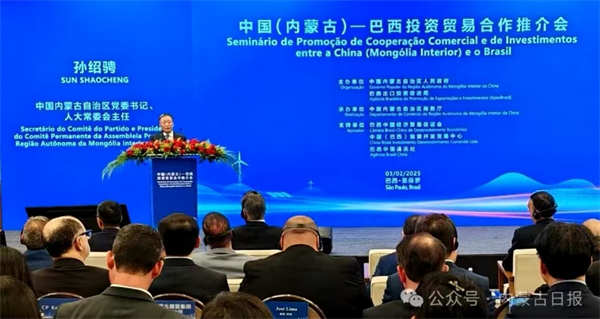
Sun Shaocheng, secretary of the CPC Inner Mongolia Autonomous Regional Committee, delivers a speech at the Seminar on Promoting Trade and Investment Cooperation Between China (Inner Mongolia) and Brazil. [Photo/Inner Mongolia Daily]
Enterprises from North China's Inner Mongolia autonomous region and Brazil signed 17 cooperation agreements and projects at the Seminar on Promoting Trade and Investment Cooperation Between China (Inner Mongolia) and Brazil, which took place on Feb 3 in Sao Paulo, Brazil.
The projects involve planting, chemicals, new energy, food, and dairy, with total investments of nearly 10 billion yuan ($1.37 billion).
The signing ceremony was a significant achievement of the Inner Mongolia delegation's visit to Brazil and Uruguay from Feb 1 to 9. The delegation was led by Sun Shaocheng, secretary of the CPC Inner Mongolia Autonomous Regional Committee.
During the seminar, Sun delivered a keynote speech. He highlighted Inner Mongolia's strong economic complementarity with Brazil in sectors such as agriculture, livestock, new energy, culture, and education.
Sun expressed hopes for further collaboration and new breakthroughs in bilateral cooperation. He also emphasized the importance of establishing and deepening sister-city relationships to explore new pathways for mutual development.
One key objective of the visit was to enhance cooperation in the agricultural and livestock industries. During the trip, Sun met with Cleber Oliveira Soares, deputy minister of Brazil's Ministry of Agriculture, Livestock, and Food Supply, and Fernando Mattos, minister of Livestock, Agriculture, and Fisheries of Uruguay.
Sun said that Inner Mongolia is a major agricultural and livestock region in China, while Brazil and Uruguay are globally recognized agricultural powerhouses and key exporters of agricultural products.
He emphasized the shared commitment to green development and wanted to strengthen pragmatic cooperation, particularly in seed industry innovation. Through government support, Sun hoped to encourage more enterprises and research institutions to collaborate on developing and utilizing grain, sheep, cattle, and grass germplasm resources, fostering high-level mutual benefits.